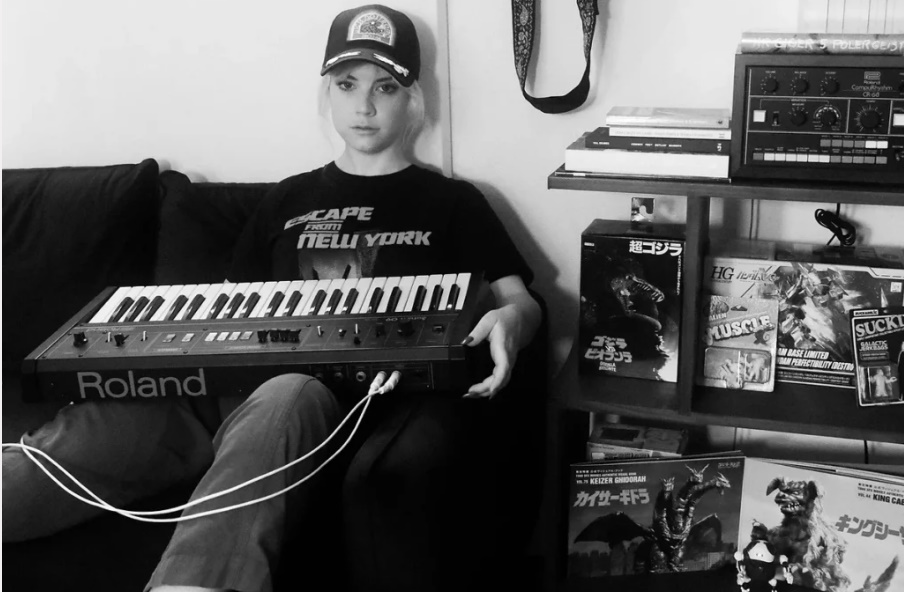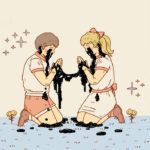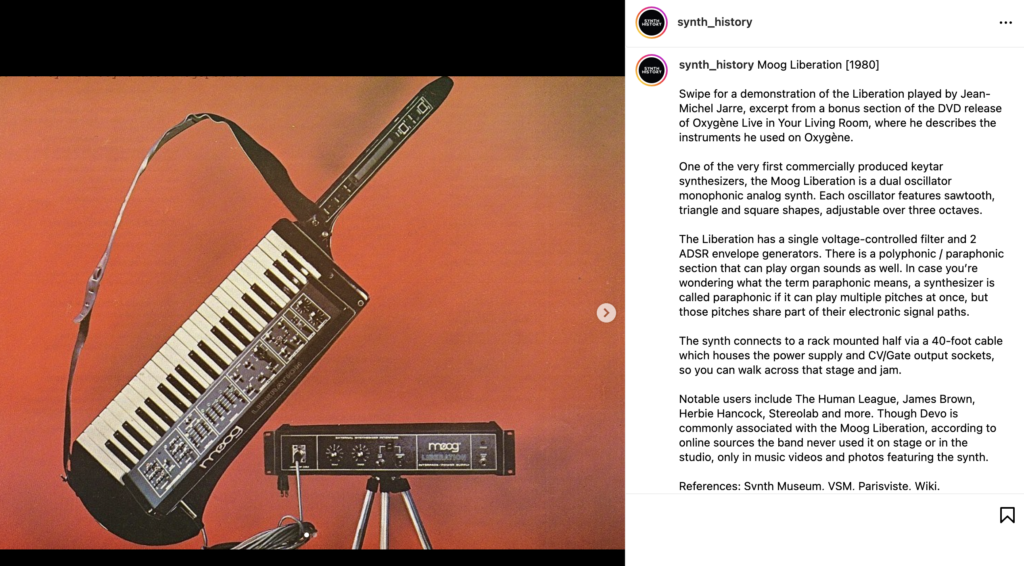Artist Interview: Danz CM of ‘Synth History’
Posted: by The Alt Editing Staff

If you’re a synth head with a brain full of patch cables and thoughts shaped like waveforms, there’s a good chance you’ve encountered the work of Danz CM in the wild. In addition to creating effortlessly cool synth-pop songs like last year’s automobile brand name-checking “Fast Cars,” Danielle “Danz” Johnson helms the growing media entity Synth History.
Synth History began as an Instagram page, offering followers a dizzying array of researched captions accompanying delightful retro photos. It has expanded into a full website, and is now on its second issue of a print magazine featuring interviews with artists like Weyes Blood, Trent Reznor and John Carpenter; Danz CM also produces a Synth History limited narrative podcast series, and music she composed as part of the podcast just got a release in the form of an album called Berlin Tokyo Shopping Mall Elevator.
Needless to say, Danz CM has many irons in the fire, but took some time out of her day to talk to The Alt about the new music and her own prior synth history, answer an indulgent query about keytars, and reveal the DIY tactics that keep her operation running. Read on for a Q&A that has been condensed for length.
MO: I’d love to talk about the Synth History project and about your new tunes, but first — how did you first get into synthesizers?
Danz CM: I started off using Ableton and software synths when I was first making music in the early 2010s, and then over the years, I got into hardware synths. My first synthesizer was a microKORG. Years later, I got into Moog, and the more I learned about synths, the more I got into them.
And then how did Synth History start?
I was posting on my personal Instagram about synthesizers, but I thought it’d be cool to start an Instagram solely on synthesizers, so I started Synth History. I did it anonymously at first, and it grew organically. I’d write a little bit about a specific synthesizer and source my references and list hashtags, and it started to gradually get really popular. Then during the pandemic, I started a website for Synth History, started doing interviews and started doing the podcast. It just kind of grew.
It turned into a lot of research and work for the magazine, the website and the podcast. It’s pretty much just me doing everything. With the podcast, there are some people that have reviewed it saying, “These podcasts take too long [to come out].” And I’m thinking , Oh my god, it’s just me writing, recording, composing all the music to it! It’s a lot to do, but it’s definitely freeing to have this outlet that isn’t my music career, and have it be something that can continue on for hopefully a while.
I have to ask, because I was doing a bit of research about you in preparation for this interview — I saw you had a music blog in the peak music-blog era. What was the vibe of your blog, and does the Synth History project feel in the same vein as when you used to blog about music?
Before I even started making music of my own, I was obsessed with all different kinds of music. When I was 14 or 15, my parents were relatively strict, and I was pretty much on the Internet at home all the time. I had a music blog and would torrent songs, torrent albums and write about them. If I liked the Beatles, I’d have to listen to every single album they’ve ever made. I remember writing about Leonard Cohen on the blog, The Killers, a whole bunch of different stuff. I guess Synth History is a little bit of a continuation of that. When I discover something new to post about on Synth History, I think, Wow, this is really cool. Other people should know about this. It’s fun when other people care about the stuff that I’m interested in and I have someone to share it with.
That is the essence of blogging, I feel, reaching out into the void and being like, does anyone else like this?? So with the print magazine, what was it like to get into the physical media zone as opposed to online?
I have always been attracted to physical, tangible things. Even with my music, I know it exists on Spotify and Apple Music, but having it in cassette or vinyl form gives it this quality that allows it to live on forever, you know? I got really into these old keyboard magazines from the ’70s and I wanted to have my own version of that. With the first issue, I compiled some of the web interviews I conducted and self-published them into ‘zine form. That’s the reason behind it. I like to be able to hold something when I read it.
Awesome. Well, turning from synth media toward music talk — this is kind of a selfish question. I have really strong feelings about keytars – which is that I love them. And I saw when I was looking at the past few Synth History IG posts, I saw the Moog Liberation, and was like, oh hell yeah. When I meet keyboard players, I ask them how they feel about keytars, and the response has been surprisingly negative overall. So: what are your personal feelings on keytars?
I think it depends on the person, if they can pull it off. For me, I don’t know if I could pull it off. I don’t know how cool I’d look, but Herbie Hancock, for instance, looks super cool with a keytar. And I think there’s a great picture of George Duke with one. But yeah, I think it depends on the person and how well they can shred. If you’re shredding on the keytar, I think it makes sense.
Right, a more virtuosic approach. That’s fair. Okay, you ask people for their favorite synths in their interviews, so I would like to ask you for your own favorite synths.
One of my favorite synths that I’ve been using for a while now is the Prophet-6. I don’t remember when I got it, probably around when it first came out, but I have the desktop module version of it. I recently got a Minimoog, which I’ve always wanted. It’s super cool, a classic. Another one of my favorites, I’m not going to say it’s the best synth in the world, but I’ve used it probably the most in my career so far in addition to the Prophet-6, is the Moog Minitaur, just because I use it live all the time. It’s so small and easy to bring around. Mine is very banged up, but it works.
I would love to ask you about the new music – you’re putting out a new release?
Yeah. This album is mainly instrumentals, short instrumentals. I have the Synth History podcast, which is a limited narrative podcast series, that I score all the music for. I have a new podcast episode coming out called Oscillators (ed note: it’s out now!). It’s a super cool episode with a few special guests on it. There was a lot of music on the episode that I wanted to release. So what started out as an EP of seven songs is now 19 songs because it includes the music from the episode as well. They’re all very short. There’s a few songs with vocals, but it’s mainly instrumental, experimental kind of stuff.
Is it getting any kind of physical release, or digital only?
I’m putting it out on cassette, limited edition.
I was hoping you would say cassette!
I try to put everything out physically through Channel 9 Records, which is a label I founded. I’m only pressing 150 cassettes, 75 are one color and 75 are another color. I’m also printing 250 limited splatter 12” vinyls.
Very cool. Last question — obviously you are doing so much, and you are doing it all yourself. Do you have any tips, not in a hustle-and-grind way, but tips for people who might want advice on doing things themselves, whether it is starting a zine or running their own record label and doing their own releases?
I mean, it sounds simple to just say “figure it out and do it”…but I will say that, pretty much anything you could ever want to do, you can find a YouTube video that will describe how to do it, or a book that does, or, you get the idea. Right now, for instance, I’m trying to write Javascript code for my Danz CM website. For my discography section, I want to create records that spin like a carousel, and then when a user clicks on one, they get the information on it. I’m using AI to help me code something that could have potentially taken me a very long time to figure out. Anything that I’ve ever approached in my life, no matter what it is I just try and figure out how to do it.
That’s how I learned music production. I didn’t go to school for music. I never had any kind of music lesson in my life. When I was first producing in Ableton, I didn’t even know that’s what it was called — that what I was doing was called “producing.” When I first started making music, I’d wonder why my voice sounded too quiet, or why my song didn’t sound as loud as other people’s songs, then I learned about mastering, EQing, and compression just by using the internet and watching YouTube videos. Anything is possible if you just take the time to research how to do it and try.
Check out Danz CM on her website here, and her Instagram here. And go listen to Berlin Tokyo Shopping Mall Elevator!.











